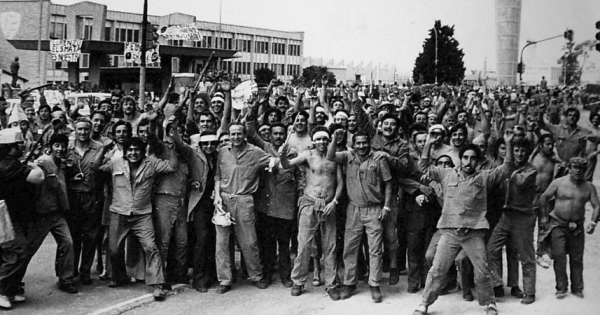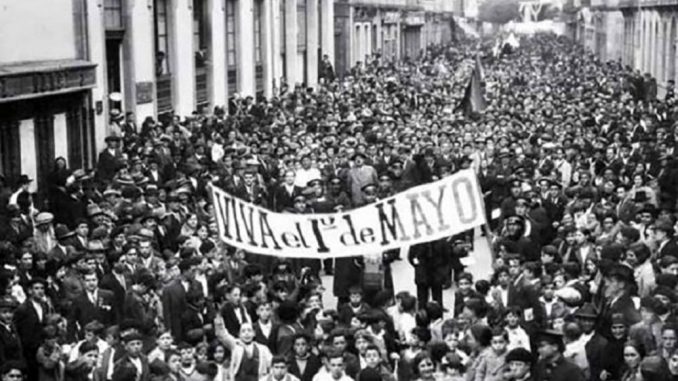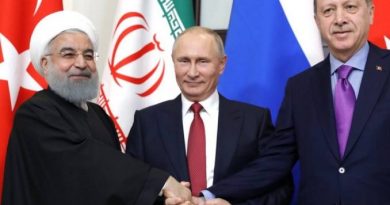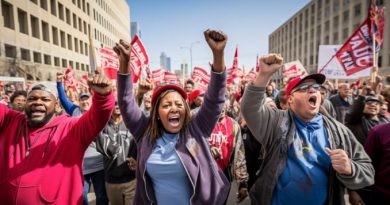1th of May: worker, socialist, internationalist. The working class is one and without borders
Except in the United States and Canada, All over the world, every May 1st is celebrated as the International Day of the Working Class.. Mass events and marches are organized, that raise the most heartfelt demands. Imperialist capitalism only offers us more and more inequality and misery, wars and environmental disaster headed for barbarism. For this reason, from the LIS we reaffirm the need to build revolutionary political alternatives to bury this inhuman system and make way for socialism..
ByPablo Vasco
On May 1, 1886, In Chicago, started a big strike for the eight-hour work day. For several days the workers clashed with the police. Eight leaders were tried and sentenced: three to prison and five to death. Louis Lingg committed suicide in his cell so as not to be executed, Meanwhile he 11 November 1887 George Engel, Adolph Fischer, Albert Parsons and August Spies were hanged. Before die, Spies yelled at his tormentors: "The voice that they are going to stifle will be more powerful in the future than how many words I can say now".
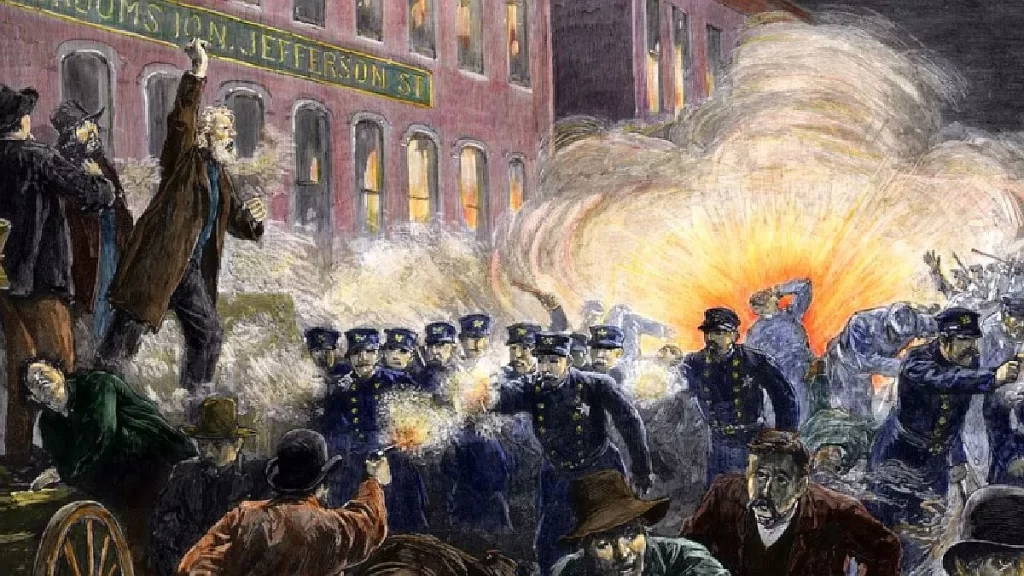
In 1889, the congress of the Second Socialist International, held in paris, established May 1 as a tribute to the "Chicago Martyrs" and as an international day of struggle for the rights of workers. Since then, by force of strikes and mobilizations, In more and more countries, eight hours were achieved and also May 1st as a non-working day and paid by the employers.. In sum, it is a date that has been imposed on the world calendar by the working class, one less day of capitalist exploitation.
What is the world of work today?
Out of a world population of about 7.900 millions of people, according to the latest ILO data almost 3.400 millions work. Mostly they do it in exchange for a salary, since there are still niches of slave or semi-slave work. Yes to that 43% directly we add the millions of unemployed workers, the millions of workers already retired and the millions who make up their families, It is evident that the vast majority of us who inhabit this planet are part of the working class., the only one that with her work produces all the goods and services.
from now, among other real divisions or encouraged by the bourgeoisie, that class is fragmented by precariousness, with more than half in informal conditions. This affects women more, which constitute more than 40% of the global workforce. But none of those weaknesses invalidates the compelling fact that, away from the neoliberal campaign on a supposed "reduction" of the working class and its role, this one exists, it's massive, grows and the decisive: everywhere he continues to defend tooth and nail his rights attacked by this capitalism in systemic crisis, increasingly exploitative and predatory.
It is that under imperialist capitalism in its current stage of decadence and social polarization there is not only nowelfare state genuine, but that a while ago it has been transformed into astate of malaise worker, youthful and popular that expresses itself in struggles, rebellions and insurrections.
A global snapshot of workers' struggles
This note does not pretend to cover all the conflicts of the globe, by the way, but only to review some examples in the different continents. He 2022 began with a popular uprising in Kazakhstan, The working people of Ukraine have already been in armed resistance for more than a year against the Russian invasion, an unprecedented semi-popular insurrection in Sri Lanka brought down the adjuster government and the year ended with strong strikes in western Europe.
A special highlight deserves the massive strikes and mobilizations in the imperialist countries, because they are the most powerful bastions of the world working class due to their social weight. In Europe, the strike wave in Great Britain kicked off, showing the recovery of his working class from the defeat that in 1985 struck him by Margaret Thatcher. There were also strikes in Italy, Germany, the Spanish State, Portugal and general strikes in Belgium, Greece and Cyprus. At the forefront are the labor movement and the youth of France against Macron's pension reform, with twelve general strikes and demonstrations of a magnitude not seen for decades, in a process of struggle that is still open and that questions the bourgeois government.
In the United States there were strikes in the educational sector -especially at the university level-, the railwaymen, Amazon warehouse workers - a measure that was extended to 30 countries-, Starbucks chain of bars, coal miners, nurses and other trades. In Latin America the piqueteros staged strong struggles, tire workers, medical residents, drivers and teachers from Argentina; the telephone numbers of Mexico, Bolivian teachers; the state ones, subway workers and teachers in Brazil, Chilean port workers and truckers, there was an indigenous uprising in Ecuador, a popular rebellion in Haiti, strong strikes in Panama and another popular rebellion in Peru that still persists despite the bloody repression.
As for Asia and Africa, there were strong strikes in Egypt -optical fiber, metallurgical, carpets-, in South Africa -health, dockers, railway-, in Iran after the great rebellion that sparked the murder of the young Mahsa Amini -oil, gas, petrochemistry, refineries, power plants and steel mills- and Indonesia -smelters and others. China witnessed several protests against the new lockdown and massive strikes in the mega-plants of iPhone. In India 200 Millions of workers carried out a general strike of 48 hours for salary increase and against privatizations. In Australia there were strikes at Pfizer, Apple Store and other companies. and at the same time, the resistance of the Palestinian peoples is strengthened, Saharawi and Kurdish.
as we see, there is practically no region of the world where the working class does not resist and give battle against the capitalists, their governments and their austerity plans.
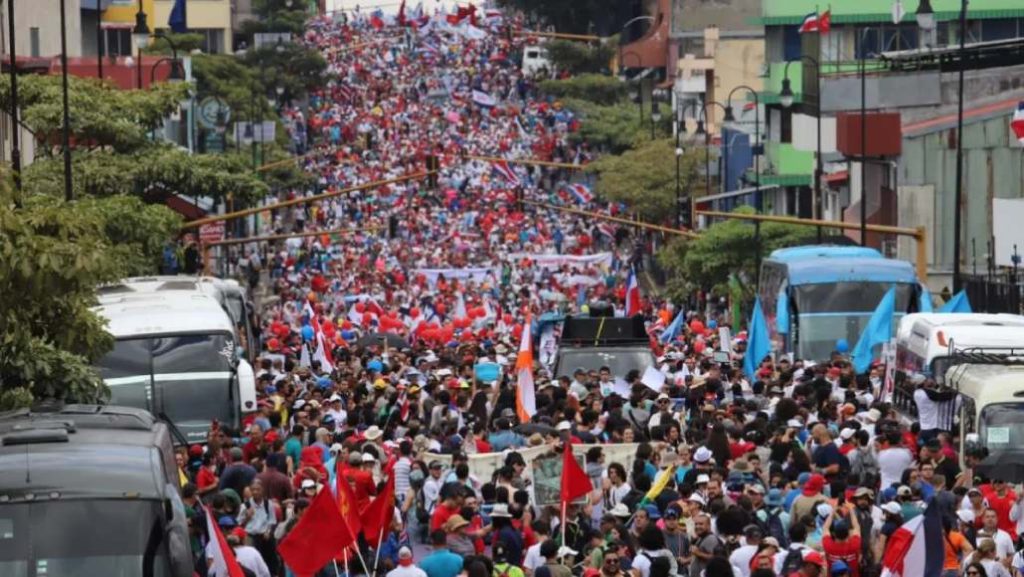
Build revolutionary alternatives
The main engine of these struggles that cross the world is the demand for wages that deteriorate without pause in the face of inflation and for working conditions., also for the right to unionize or against dismissals and company closures.
In general, the union bureaucracy is not yet overwhelmed by a new leadership and/or organizations of democratic self-determination of the bases, but in the heat of the struggles a young and combative vanguard emerges that is organized from below. With inequalities and particularities according to each country, a new militant generation plays a prominent role in the struggles, look for forms of coordination, advances in his experience with the old restraining directions, becomes radicalized, debate and is open to political dialogue with the revolutionary left.
As well expressed in the Document on the world situation approved at the 2nd World Congress of the LIS, held last March in Barcelona: “The capitalists today do not have enough strength to inflict historic defeats on the struggles that are taking place, and although the leadership problems of our class and the popular sectors do not allow them to resolve the capitalist crisis in their favor either., the fight against the attacks on the standard of living and the growing authoritarianism will continue. That is why the perspective that we visualize is towards a deepening of the ascent, with more strikes, recurring mobilizations and rebellions.
“Our challenge is to take advantage of this new stage in each country to train our youngest cadres, structure ourselves socially and politically in the working class and the most dynamic sectors of the mass movement and take leaps in our construction, being aware that we are just at the beginning of a process that will tend to deepen and will give us multiple opportunities to move forward.
“Only if we advance in the construction of strong revolutionary socialist organizations at this stage and manage to lead sectors of our class can we become an objective factor that counteracts the weaknesses of the processes, help the labor movement to play the strategic role that is needed and challenge for power in the next rebellions and revolutions that occur. Only then will we make the situationpre-revolutionarythat we went through did not end up going back, be transformed intorevolutionaryand we can change history”.[i] On this May 1st, so, from the International Socialist League we salute and convey all our solidarity to the workers who throughout the world, sometimes in very difficult conditions, They fight relentlessly for their rights.. In France, against pension reform. in Ukraine, against the invasion of Putin's troops and at the same time against the government of Zelensky. To the labor activists of Belarus who face the persecution of the dictator Lukashenko. To the workers of Kenya and all of Africa, who fight against hunger and neocolonial exploitation. To those of Nicaragua, who organize for their social and democratic rights. To each and all of them, from Pakistan to Lebanon and from the US. to Argentina, go our class and revolutionary hug. The working class is one and without borders!
